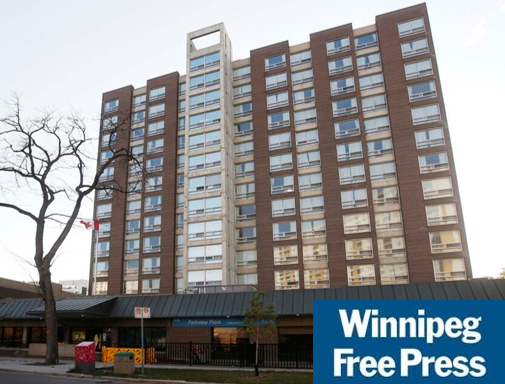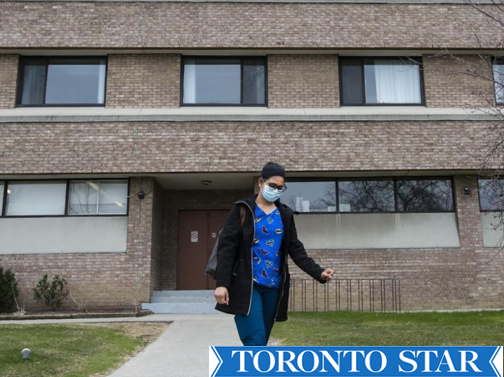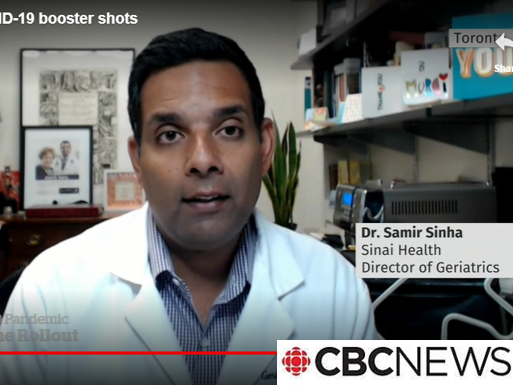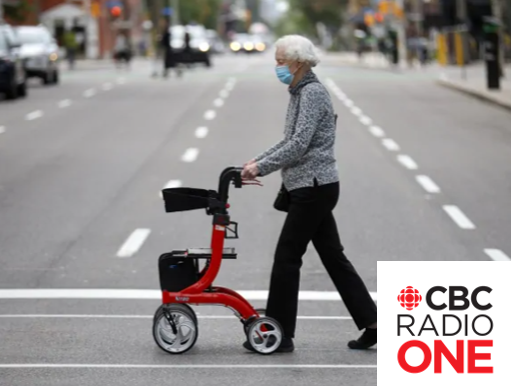During the worst days of the pandemic, many seniors homes across the country were incapable of protecting their residents from a devastating wave of COVID-19. The disease ripped through the homes, causing more than 15,000 deaths according to Ryerson University’s National Institute on Ageing, with the majority in Ontario and Quebec.
Read MoreHundreds of homes across Canada did not fare that well, as ineffective infection control measures, low standards of care, and in many cases, low wages for staff, had devastating consequences. More than 55,000 residents and more than 29,000 long-term care workers have been infected with COVID-19.
The Ryerson University National Institute on Aging has tracked 15,217 COVID-19 deaths among long-term care residents since March 2020, 57 per cent of all deaths from the pandemic in Canada to date.
Are booster shots needed for the general population? Dr. Samir Sinha, NIA Director of Health Policy Research, talks to guest host Ted Henley about this debated topic.
"We know that there is waning immunity, but right now we don't necessarily have evidence to say that at this point in time, this is exactly when you need to have a booster, because it's going to reduce your risk of dying or ending up in a hospital," says Dr. Sinha.
Dr. Samir Sinha, NIA Director of Health Policy Research, said the issue of a third dose treaded on “complicated territory,” as many countries were still trying to access limited supplies to vaccinate its population with a first and second dose.
Read MoreDr. Samir Sinha, Director of Health Policy Research at Ryerson University’s National Institute on Ageing, told the Western Standard the pandemic made Canadians more averse to care homes than ever.
“Canadians have never aspired to end up in a long-term care home. Pretty much everybody would like to stay in their own homes for as long as possible,” Sinha said in an interview.
Federal poll workers won’t be required to be vaccinated: Elections Canada
Making sure poll workers are vaccinated would help make polling stations safer for everyone, agrees Dr. Samir Sinha, NIA Director of Health Policy Research.
“We think that the one of the greatest groups that is going to be coming into contact with millions and millions of Canadian voters are going to be those who are working and volunteering at our front line polling stations,” he said.
Assessing Canada's COVID-19 rollout
A new report released today from the NIA takes a look at Canada's vaccine rollout strategy, with a focus on older adults. "What we found was, every province and territory implemented their strategy differently, they interpreted the guidance from NACI differently, and that potentially had deadly consequences, in addition to the slow initial supply of vaccines. Delaying second doses in some places had quite deadly consequences, especially in Ontario," says Dr. Samir Sinha, NIA Director of Health Policy Research.
Read MoreA return to freedom, after nearly a year trapped indoors under lockdown
By: Catherine Porter
For all but five weeks between March 2020 and June 2021, care home residents in Toronto were not permitted to leave their buildings for nonmedical reasons, not even a stroll. Many compared themselves to caged animals or prisoners. The lucky ones lived in residences with attached courtyards, where they could at least feel the sun on their faces.
“At this point,” said Dr. Samir Sinha, NIA Director of Health Policy Research, “the risks of loneliness and social isolation are far greater than dying from COVID-19 in these homes.”
A year in solitary confinement. The story of the man whose pandemic took away his freedom of movement
By: Adrian Cochino
Care centers in Canada were among the first places in the country to receive the COVID vaccine. By February, all residents of these Ontario homes had already received the first dose. But the restrictions have not changed. Dr. Samir Sinha, NIA Director of Health Policy Research, explained that the authorities were so afraid of the increase in deaths that they preferred not to relax the measures.
Read MoreParkview Place closure sparks home care discussion
By: Katie May
Dr. Samir Sinha, Director of Health Policy Research for Ryerson University's National Institute on Ageing, is part of the team working on creating new national standards for Canada's long-term care system. The standards are expected to be finalized next fall.
Sinha said many of the issues at Parkview Place that led to widespread infections during the COVID-19 pandemic — including crowded quarters and lack of staff — are common systemic problems brought on by chronic underfunding of long-term care homes and management companies' razor-thin profit margins to keep them running.
An aging Winnipeg care home is closing and many more need upgrades
By: Joe Scarpelli
It’s not clear how many care homes in Manitoba are considered outdated, but in Ontario for example, one in three beds are from 1972 standards, according to Dr. Samir Sinha, NIA Director of Health Policy Research.
“They’re not actually designed to meet the modern day standards,” Sinha said.
Dr. Samir Sinha, NIA Director of Health Policy Research, says the best way to prevent future outbreaks is to ensure staff are doubled dosed.
"If we can get 99 per cent of our residents vaccinated we need to have 99 per cent of our staff vaccinated too. It still puts a number of residents at risk, I don’t really believe that health care workers should have the right to necessarily put frail vulnerable people in their care at risk."
“The requirement to ensure that these spending plans at the provincial and territorial level with these federal dollars are detailed and made public, I don’t think that’s too big an ask, when the vast majority of Canadians have lost trust in our long-term-care systems,” says Dr. Samir Sinha, NIA Director of Health Policy Research
Read MoreHelp improve long-term care in Canada by completing new Consultation Workbooks to support HSO’s new National Long-Term Care Services Standard
HSO's new Consultation Workbooks have been developed to ensure Canadians have a clear voice in the development of HSO’s new National Long-Term Care Services Standard.
The Consultation Workbooks can be completed by anyone who is interested in providing their input on improving the delivery of long-term care in Canada, whether you are a long-term care resident, family member, health care provider, researcher or anyone else.
HSO particularly welcomes those who have already completed their inaugural National Survey to complete a Consultation Workbook by responding to more specific consultation questions that arose out of the more than 16,000 survey responses, to help them better develop the new standard.
Canadians died of COVID-19 in long-term care by the thousands. So why are there so few coroners’ reports?
By: Karen Howlett
Ontario went into the pandemic with an oversight regime that left it up to operators of nursing homes to flag any deaths that required investigating. As the virus spread, family members struggled against a system not necessarily interested in working for them, said Samir Sinha, NIA Director of Health Policy Research.
“Everything just kept on getting dismantled, so that there really became no mechanism in place for accountability,” he said. “We were just leaving it up to the homes and hoping for the best.”
‘It changed everything’: Pandemic prompts science table adviser to seek Ontario Liberal Party nomination
Nathan Stall, a member of the province's COVID-19 science advisory table, is taking the leap into politics, seeking the Ontario Liberal Party nomination in Toronto–St. Paul's.
The pandemic changed everything for the people Stall cares for — he's a geriatrician with the Sinai Health System and older adults have borne the brunt of the virus.
In the early days of the pandemic, he authored groundbreaking research on the cause of catastrophic outbreaks in Ontario's long-term care homes that tied the tendency for bigger, deadlier outbreaks to occur in for-profit homes to their overcrowded outdated infrastructure, which influenced government policy.
He became a member of the province's science advisory table and a public advocate for older people, speaking out in the media about how the Ontario government and society at large were failing them.
"And it changed everything for me personally, seeing that I could be out there publicly advocating for something and advising, and trying to exact change and to protect vulnerable individuals," Stall told QP Briefing. "And that's something that I see coming out of this, the greatest opportunity for me to further that work as a public office. And that's why I've decided to do this."
Fixing long-term care in Canada could cost $13.7B, budget watchdog estimates
A report published this morning by parliamentary budget officer Yves Giroux estimates ending wait lists, increasing staff pay and benefits, providing more hours of care each day and expanding home care could cost around $13.7 billion.
Dr. Bonnie-Jeanne MacDonald, a Director of Financial Security Research at the NIA, said nobody should be surprised by the size of the figure, but added it’s time for Canadians to have a conversation about “what kind of Canada do we want people to age in.”
MacDonald said that report confirmed what those familiar with the system had known for years. But she said the pandemic didn’t just blow the lid off any illusions Canadians had about the standards of care homes for vulnerable seniors, it made most Canadians think they didn’t want to ever live in one.
When privacy and public health clash: Vulnerable families face fear and frustration not knowing if health-care workers are vaccinated
By: Maria Sarrouh and Olivia Bowden
With most paid home care in the province coming from government-funded agencies, the vaccination status of the majority of agency workers is unknown, said Dr. Samir Sinha, Director of Health Policy Research at the NIA.
“The government is operating to a certain extent in the dark, as are the home-care agencies,” he said. Care co-ordinators who manage the contract between the family and the provider won’t be able to disclose vaccination status, as agencies haven’t informed them either.
Those who are concerned about older family members, someone who is immunocompromised or a child receiving care from an unvaccinated individual, may have to turn to the private sector, Sinha said.
Israel to offer COVID-19 booster shots
People in Israel over the age of 60 will soon be able to receive a third dose of the Pfizer/BioNTech coronavirus vaccine as the country deals with the delta variant. In Canada, experts aren’t sure whether a coronavirus booster shot is needed yet.
"Our bigger issue is that we just don't have enough Canadians or people around the world vaccinated with two doses of protection," says Dr. Sinha, NIA Director of Health Policy Research.
'Fear ageism, not aging': How an ageist society is failing its elders
"You know, it's deeply disturbing when people start finding reasons to make our older people expendable or seen that they are less important than who they are," says Dr. Samir Sinha, NIA Director of Health Policy Research. We've almost doubled our life expectancy over the last hundred years, and somehow we operate in this framework that those who have aged in our society have become rather 'useless eaters'" says Dr. Sinha.
Read More



















